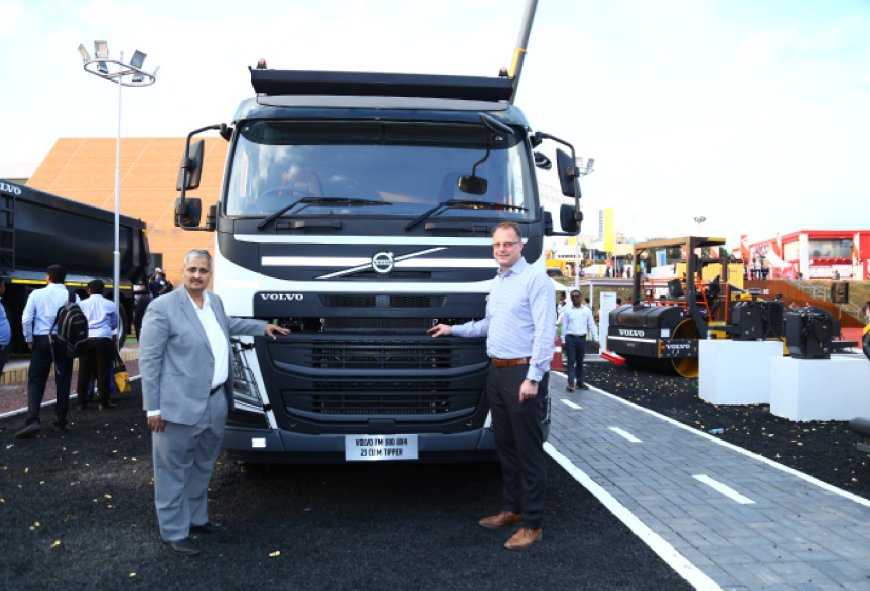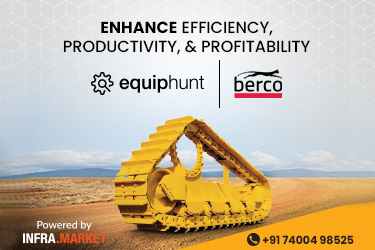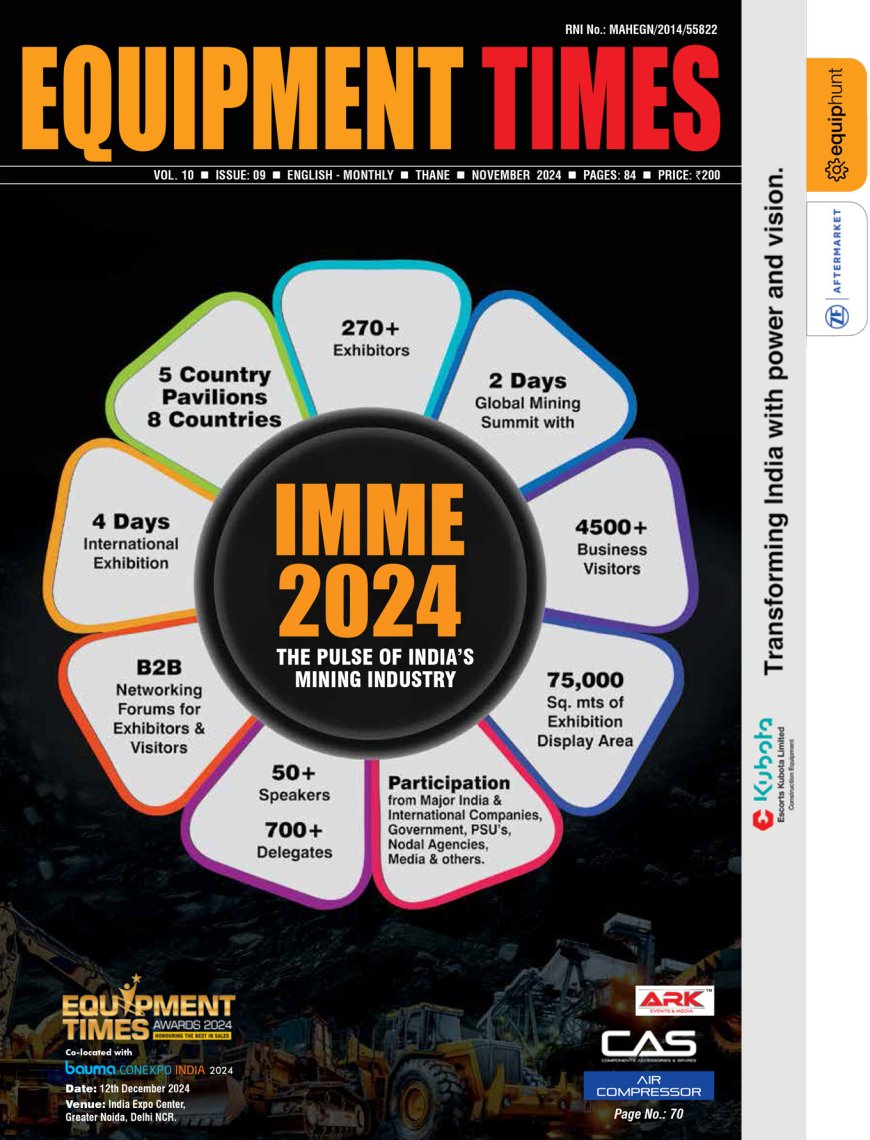Customer success is a value that is completely embedded in our culture
Jonas Nilsson Vice President, Hub India Volvo Trucks The concept of ‘Make in India’ for the world seems to have caught up with most of the OEMs. What is your take on this? Indian


Jonas Nilsson
Vice President, Hub India Volvo Trucks
The concept of ‘Make in India’ for the world seems to have caught up with most of the OEMs. What is your take on this? Indian CE industry taken as whole what is the current growth and expected CAGR in export?
Volvo Trucks provides complete transport solutions for professional and demanding customers, offering a full range of medium to heavy duty trucks that are assembled in 14 countries across the globe. The Volvo Truck components and complete vehicle models manufactured at Volvo Group’s plant in Hosakote, near Bengaluru, primarily serves the India market’s requirement.
However, this is not the only measure of how Volvo Trucks contribute to ‘Make in India’. Local suppliers, which meet both the technical requirements for Volvo Trucks and the supplier requirements of Volvo Group manufacturing, also export components for the complete vehicle manufacturing in one or several of the 14 countries mentioned above.
Another aspect of how Volvo Trucks contribute to ‘Make in India’ is the R&D projects and administrative services performed for the brand by various Volvo Group functions in India.
Brief us on the scope and potential for export of your range of products?
The Indian OEMs export special vehicles manufactured on our chassis and Indian customers are able to venture into export business thanks to the local support and market knowledge available with Volvo Trucks. Direct exports of Volvo Trucks produced in India is one of several potential developments for our Group’s International Manufacturing organization.
Which are the major markets that you focus on and what are the factors contributing to it? Are there separate investment / R&D efforts for this? Could you brief us on the same?
It’s too early to comment on the same. For Volvo Trucks, some of the key elements that make us the most preferred European truck brand globally is a focus on customer success and to drive innovation and progress in industry. Services are an increasingly important part of our complete business solution.
To unlock the potential customer benefits in, for instance, digitization and connectivity will require even more collaboration between industry, academia, authorities and technology partners.
Do you have a separate product range for the global market?
OEMs and customers can be reassured that a Volvo Truck is a Volvo Truck wherever it is manufactured. This promise provides one answer as to why demanding customers prefer Volvo Trucks – it is designed and built to operate in the toughest environments globally. Bodybuilders can be reassured that Volvo Trucks is a truly global brand that can meet local requirements and will support their international sales.
As the global markets are highly competitive, especially in terms of quality of the product and backup support, how have you ensured the same to cut a niche in those markets?
Customer success is a value that is completely embedded in our culture and over the years Volvo Trucks have built a global support network of dealers with 2,100 service points in more than 130 countries to ensure that we can deliver just that.
How does the company address the logistical / policy based challenges with reference to the global market? Do you expect any policy reforms or incentive systems from the government that may boost the export?
I believe that the best reforms for Indian government to boost the export sector over time is to continue to align the national requirement with international policy frameworks. Adapting a framework which is widely accepted enables manufacturers in India to have a sufficient volume base in India which enables export.
What is your outlook for the next two years? Is there any further investment on pipeline or new model / variant on the launch pad?
We are expecting the market revival towards early part of 2021, post the transition towards BS6 and once the customers have experienced the products. With the infrastructure sector expected to grow exponentially, it will be a great opportunity for us to help our customers with high productivity trucking equipment. Investments have been made towards the change over from BS4 to BS6. And while we expanded into multiple segments – we will be looking into newer solutions and technology that drives a customer business to succeed.
How do you assess the impact of the Budget 2020 on the CE industry? Also tell us on the outlook especially the product range that you deal with?
From Volvo Trucks perspective the budget is progressive with declared investments into roads and infra projects, supported further by increasing FDI investments. Big needs and high ambitions drive the necessity to do more with less and to continue to drive reforms which support responsible and efficient business. Our products and services offer just that why we have a positive outlook for our business in India in 2020 and years ahead.
Your vision for Volvo Trucks India 2020?
Going forward with the Govt’s focus on Infrastructure segments, regulatory changes, execution of the road projects and strong overall GDP growth forecasts, we are optimistic about the requirement for premium trucks in the coming years. We believe in the India growth story and are confident about the long term prospects of the market beyond the current circumstances. We will continue to pioneer the premium trucks segment in India, by bringing in technologically advanced quality products and world class service support for our customers. We want our customers to perceive Volvo Trucks as the No.1 truck brand to own.
What is the future of electric trucks in the Indian market? Do you think such an innovative concept will be a hit within the current price point that the country has?
The speed of electrification will depend on a number of factors. On the one hand, an extensive expansion of the charging infrastructure is needed, and on the other hand it’s necessary to ensure that regional power networks can deliver sufficient transfer capacity in the long term. Financial incentives are necessary to induce more haulers to invest in electric vehicles.
Indian Govt has clearly set an ambition to introduce electric vehicles, and we understand that it’s fast approaching. Air quality in some Indian cities are among the worst in the world and huge number of people suffer from air pollution related diseases. The total cost for society needs to be considered for these investments, not the cost for a truck itself. Electric trucks requires an alternative eco system to be developed, on larger scale it has its own challenges. Initially, electric trucks may be a niche where the required supporting infrastructure can be developed.
But as a Premium CV player, we operate largely in specific businesses and with customers that take overall operational efficiency in consideration, and in key businesses like Mining [Overburden Removal / Coal Transportation] and Construction & Infra and hence we do not compete on price but its value.
Hits: 21









